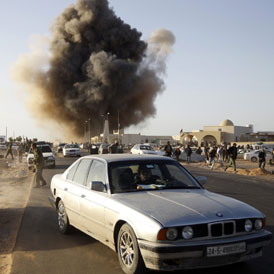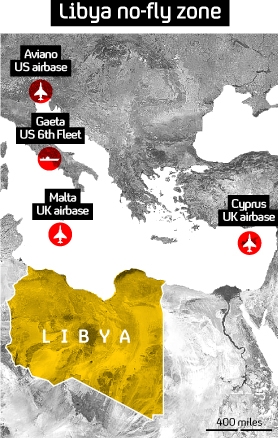Libya: Calls for no-fly zone gather pace
Pro-Gaddafi air strikes on rebels in East Libya could hasten calls for a no-fly zone, even without unanimous support in the UN Security Council, Channel 4 News learns.

Libyan troops have continued to attack the oil port of Ras Lanuf on Tuesday with a series of air strikes that, although reportedly causing few casualties, have further raised the prospect that the United Nations may impose a no-fly zone over Libya.
Three strikes on Tuesday morning followed air assaults the day before that hastened proceedings to impose a no-fly zone in Libya. The difference between the assaults is that Tuesday attacks were more regular and appeared to be more precise and targeted than those that had come before.
The action in Ras Lanuf is designed to regain key positions that Gaddafi had lost to rebels last week. Pushing the rebels back from nearby Bin Jawad on Monday, pro-Gaddafi forces has unleashed air strikes at a checkpoint on the outskirts of the town.

Initially proposed by David Cameron, the no-fly measure is now backed by France and the Arab League. On Monday, French Foreign Minister Alain Juppe released a statement to say that after discussion, he and the League’s Secretary General Amr Moussa backed an action to impose a no-fly zone. Accessible US and UK army bases around the meditteranean as well as naval carriers in the area means a no-fly zone could be quickly adopted.
A further meeting of the Arab League is due to take place on Saturday in Cairo to discuss the situation in Libya, who themselves left the League in 2002.
NATO have launched 24-hour surveillance of Libya as the organisation formulated plans on how to deal with the escalating conflicts in the North African country. NATO Secretary General Anders Fogh Rasmussen admitted that no military intervention would go ahead without the UN Security Council’s go-ahead, though. He assured that action would be taken if Gaddafi’s attacks on his own people continued:
“I can’t imagine the international community and the United Nations would stand idly by if Gaddafi and his regime continue to attack their own people. We have asked our military to conduct all necessary planning so that we stand ready at short notice.”
Ivo Daadler, US ambassador to NATO, told journalists that plans were well developed for a number of possible options to be used including a no-fly zone. The surveillance, carried out at 30,000 feet by AWACS (Air Warning Control System) planes will help NATO and the UN understand fully the situation on the ground across the country, where widespread and sporadic fighting has been the order of the conflict so far.
It is believed that a draft resolution is being formulated by the US, UK and France that will be put to the 15 members of the council and will be triggered into action if surveillance and reports from the ground indicate that “gross violations of human rights are committed”.
It is their choice to make how they operate moving forward. And they will be held accountable for whatever violence continues to take place President Barack Obama
The need for all members’ signatures to impose the UN sanction could be the stumbling block however, with universal support from the member states of the Security Council needed to action a no-fly zone. Although there has been unanimous condemnation of Gaddafi’s actions against his people, it is still unclear whether member states would be prepared to approve the use of military force, after Russia initially rejected such a move.
Channel 4 News spoke to Sir Richard Dalton, an expert in Middle East and North Africa relations, who highlighted that any military action would need complete solidarity: “It has to have legitimacy, otherwise it would be better not to do it, it will need a full degree of support. In todays world what constitues a full degree of support will be a United Nations resolution or a wide consensus of relevant parties.
“If, as it has been suggested, Russia would never sign it, then a consultation in the region, and agreement between states in North Africa, North America, Latin America and Europe could go in as a military consensus”.
The initial scepticism of a no-fly zone has wained, notably from France which now seems to back such a move. President Obama added to the feeling that patience was wearing thin with a strong warning to pro-Gaddafi troops: “I want to send a very clear message to those who are around Colonel Gaddafi. It is their choice to make how they operate moving forward. And they will be held accountable for whatever violence continues to take place.”
The consensus for a no-fly zone now present amongst the Arab League and neighbouring African nations will also add support to the proposals led by David Cameron and William Hague.
Lindsey Hilsum discovers support amongst the rebels for David Cameron's rhetoric against Colonel Gaddafi, but have the Foreign Office and William Hague irrevocably tarnished this reputation with the latest failed diplomatic effort in Libya.